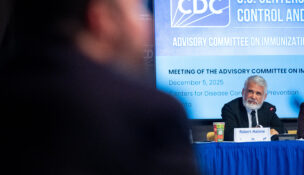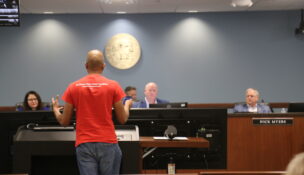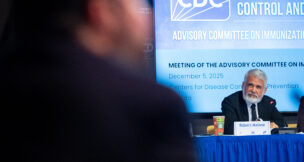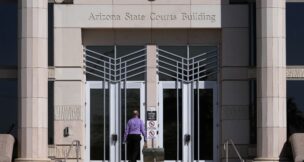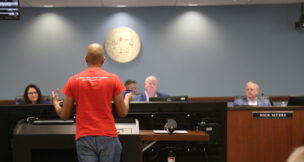Kathryn Ptak: Mission-driven director of the Department of Child Safety
Reagan Priest Arizona Capitol Times//November 9, 2025//
Kathryn Ptak: Mission-driven director of the Department of Child Safety
Reagan Priest Arizona Capitol Times//November 9, 2025//
Kathryn Ptak spent most of her career working in child welfare before becoming director of the Department of Child Safety earlier this year. She says her personal connection to the system and her mission-driven personality have made child welfare work her calling.
Answers have been lightly edited for clarity.
Can you tell me a bit about your career trajectory so far?
I graduated from law school in 2011, moved to Phoenix, got a job at the Attorney General’s Office, and my client was DES, the Department of Economic Security, which at the time included Child Protective Services. So I represented both agencies. When Gov. (Jan) Brewer separated DCS into its own agency, shortly after that happened, I came over as the deputy general counsel. I also did our legislative work. I did that for three years. Then I went and ran the Clemency Board. I did that for a couple of years. I missed child welfare, so I went to Casey Family Programs, which is a national nonprofit that works to safely end the need for foster care. Then, after a year, when Governor (Katie) Hobbs took office, (then former Director) David Lujan asked me to come back as general counsel, which I did for about two years. Then I became the director.
Did you ever imagine yourself becoming the director of DCS?
No. Actually, when I first heard my name was being floated, I thought it was a joke. Just because I never, ever imagined that. When I was here before, Directors (Greg) McKay and (Mike) Faust were these larger-than-life personalities. They were people that I really looked up to and I thought they were just so great. I never imagined that I would be, not filling their shoes, but in the same role as them some day. I’m glad to be here because putting me in this role has given the agency a sense of stability. I’m the fifth director in two years. So that causes a lot of anxiety for the workforce. I think putting somebody who has done the work and has moved from the frontline up, I think people were happy with that. They know that I’m not going to come in and fire everybody and start things from scratch. But I also think it’s a testament to the work that the agency has done, that the Legislature and the Governor’s Office feel like we’re moving in the right direction, and want to keep it going in the direction that we’ve been going. So obviously, we believe in continuous quality improvement. We’re a learning organization. We’re never going to say “We did it, mission accomplished,” but we have made significant strides from where we were.
What has kept you interested in child welfare work?
I think it’s the most important work that you could do. I’m a mission-driven person, and so I have to care about the mission in order to stay engaged in something. I was a foster parent. I adopted my oldest daughter out of foster care, and so, I’ve seen both sides of it. I’ve been a client and also worked in the agency. The people who work here are really special, because they’re mission-driven as well. And so it’s just a really great team, and it’s a really great place to work, too.
How has that personal connection to the system influenced your work?
It’s made me more empathetic to the families that we work with, both the birth families and the caregivers. As caregivers, we’re asking them to do something kind of impossible, like love this child like it’s your own, but we’re also going to potentially move the child somewhere else. Or you’re opening up your home to a kid that you don’t know what their background is or whatever. So I think it helps me understand some of what they’re going through, as well as what the birth families are going through. So I have a good relationship with my daughter’s birth family, and understanding that they’re going through a hard time, but it doesn’t necessarily mean they’re bad people, and being able to maintain that relationship is really important.
Your job is often described as one of the toughest in state government. How do you manage that?
It’s definitely a challenging job because we’re dealing with a hard subject matter, and we’re dealing with families often on their absolute worst day. The good part, though, is that we get to help them through what they’re going through. So that way, if they’re able to get their kids back, they’re safer, stronger parents. The kids are in a better place than where we found them. I’m able to do it because I have a really great team. My two deputies, all my assistant directors, everybody, they’re really really great. And if I didn’t have the support of a really good team, there’s no way I’d be able to do the job, quite frankly.
What do you wish lawmakers knew about the agency?
There are two things. So one, we’re a data-focused organization. I think a few of these high-profile events that are incredibly tragic but are very low frequency are being used to paint a picture of an agency that is completely dysfunctional, and that’s really not what our data shows. We get 160,000 calls a year to our hotline, we investigate 50,000 cases a year, and the vast majority of our families walk away better and stronger because of our involvement. To use a couple of these high profile cases to paint this picture of an agency that needs complete reform is just not based on the reality of the data that we know. I think the other piece I would say is that when you have a tragedy occur, to place blame on an individual who’s working in a system that is as complex as child welfare – that is completely oversimplifying what has happened, because there are so many different pieces that have to come together in order for us to do our work. No one shows up to this job hoping something is going to go bad on their caseload. They’re here because they care about kids. They want to do a good job. So if we assume the decision making made sense at the time, then when we’re looking back on one of these tragedies, we want to understand what information they did not have, what resources they did not have, and how do we fix that piece. And I know people want answers yesterday, but we have to follow the process the right way, or we’ll solve the wrong problem, and then we’ll be right back where we started.
What was your time on the Board of Executive Clemency like and why did you return to child welfare work?
It was interesting. I would say, “I’ve worked in child welfare for a long time. Nothing shocks me. I’ve heard it all.” And then I went there, and I was like, “These are some different fact patterns than I’ve known in the past.” What really struck me at the clemency board was the number of people who either, as children, had child welfare involvement or who should have. It was very eye-opening for me to see the impact of when we get it wrong, what happens down the line. So I think that was really important from that perspective. You don’t get bored working there. I came back to child welfare because I missed it. I feel like that’s my calling. As a mission-driven person, I think it helps when you’re dealing with the bureaucracy or the day-to-day stuff that’s irritating in any job. If you care about the work you’re doing, it makes it easier.







